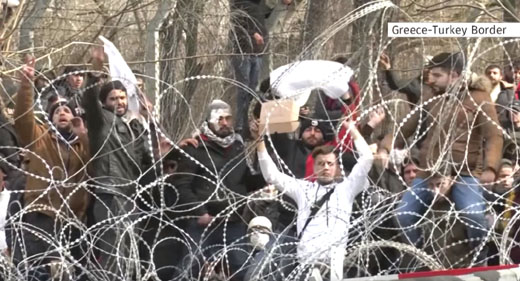FPI / February 21, 2020
By Paul Crespo
Shortly after Turkey suffered its worst single-day military casualties at the hands of Russian-backed Syrian government forces in Idlib last week, President Recep Tayyip Erdogan publicly stated he was opening Turkey’s borders to Syrian refugees fleeing into Europe.
“We opened the doors. The flow of migrants may reach about 25,000-30,000 today. We will not close the doors hereafter,” Erdogan said Saturday, according to Bloomberg.

Erdogan’s move is an apparent attempt to extort the European Union (EU) into supporting Turkey’s military campaign in Syria, which it has so far refused to do. Erdogan has urged the EU and the international community to share the burden of refugees and said Turkey would like NATO’s support as well, going so far as to demand an emergency summit under Article 4 of NATO’s charter to address the escalating crisis in Syria.
Article 4 stipulates any NATO member can request consultations whenever they believe their territorial integrity, political independence or security is threatened. As noted by the Telegraph, “it is only the sixth time in the alliance’s 71-year-old history that such a request has been made.” It is one step short of invoking Article 5 of the Treaty, which deems an attack on any one member of the alliance is treated as an attack on all NATO members.
In response, NATO envoys held emergency talks Friday. However, while urging de-escalation in Syria, NATO offered no additional assistance. European leaders remain wary of Turkey’s unilateral military intervention in Syria’s conflict. Euronews reported that Austria has accused Turkey of blackmailing Europe with the latest migrant crisis, with Chancellor Sebastian Kurz calling it an “attack by Turkey on the European Union and Greece,” adding, “As the European Union, we mustn’t be susceptible to blackmail.”
Kurz went on to say that Turkey’s actions have now created a trial by fire for the European Union, “If the external border protection of the European Union doesn’t work, then Europe without internal borders is history.”
The current escalation between Turkish troops and Russian-backed Syrian forces has raised the prospect of an all-out war with millions of Syrian civilians caught in the crossfire. While all of Europe is threatened by Turkey’s open borders and this new wave of refugees, Greece and Bulgaria will be most directly and dramatically impacted.
Both countries increased security at their borders with Turkey. Time reported that in Athens, Greek Prime Minister Kyriakos Mitsotakis convened an emergency meeting of top security officials Saturday morning to deal with the serious issue.
On the ground, a Greek police officer told The Associated Press migrants were trying to force their way through the 200-kilometer (125-mile) land border with Turkey, and groups were being constantly repulsed. Others were making their way to Greek islands in small boats from the nearby Turkish coast. According to Bloomberg, Greece has prevented more than 4,000 illegal border crossings, arrested 66 people, and plans to build more ring-fenced refugee camps.
Meanwhile, the possibility of a direct Russian-Turkish conflict on the ground grows, even as Erdogan and Russian President Vladimir Putin held emergency phone talks and agreed to a summit this week in Moscow to lessen tensions. Kerim Has, a Moscow-based expert on Turkey-Russia relations, said that Russia’s “long-term strategy” for Syria had not changed, but it was keen not to antagonize Turkey, especially given the closeness of economic and energy ties as well as the cooperation on the S-400s.
“A full military confrontation in Syria is now less possible” after a day of intense diplomacy, he told AFP, while warning that “risks are brimming on the ground” and any clash could send tensions spiraling again.
Turkey and Russia have been increasing their ties to the chagrin and consternation of the United States, and NATO, but Erdogan’s interest in maintaining Turkey’s influence over the Idlib area after Syria’s civil war ends continues to conflict with Putin’s ambition of seeing the Syrian regime regain control of the entire country with Russia’s support.
A Syrian government victory in Idlib, and Turkish defeat, would provide Putin the greatest Russian military victory since the collapse of the Soviet Union.
Paul Crespo is CEO at SPECTRE Global Risk [http://www.spectreglobalrisk.com/] and Washington Editor of the Free Press Media Group [http://freepressmediagroup.com/]
Intelligence Brief __________ Replace The Media
